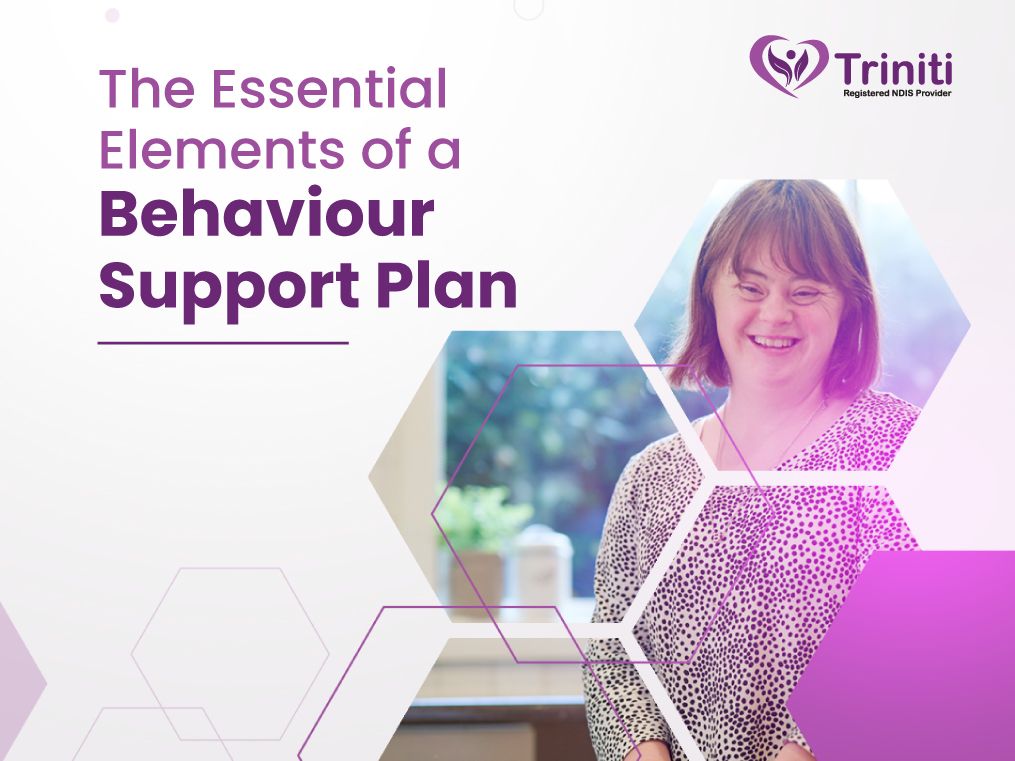+ News and Articles +
The Essential Elements of a Behaviour Support Plan
17 Sep 2025 by Bineesh George
Providing care to someone with a disability usually includes much more than just physical care. A crucial part of the support is to understand and address behaviours of individuals that can directly or indirectly impact their wellbeing and that of people around them.
A Behaviour Support Plan (BSP) is carefully designed by including structured methods to regulate behaviours of concern and thereby improve their quality of life. Under Triniti Disability Home Care’s NDIS disability services, complex behaviour support focuses on promoting independence, dignity, and inclusion while ensuring safety and respect.
Understanding a Behaviour Support Plan
Support for people displaying behaviours of concern can not be the same for each individual. This is where a Behaviour Support Plan has its perks, as it is a customised document designed to instruct how the support is provided. Trusted NDIS registered providers like Triniti Disability Home Care look deep into an individual as a whole, not just analyse the behaviour we see on the outside. A well-designed support plan consists of strategies that encourage positive outcomes, identify triggers and understand hidden needs.
Key Elements of a Behaviour Support Plan
1. Assessment and Understanding
Every BSP begins with a thorough assessment of the individual’s needs, strengths, and circumstances. To provide the best complex behaviour support, the provider will identify the causes of behaviours, whether environmental, sensory, emotional, or medical. This helps in creating the best scheme for each candidate.
2. Person-Centred Goals
The plan should never focus solely on controlling the behaviour. The individual’s unique goals and values should be discussed beforehand, and the plan has to match it. Well-experienced NDIS registered providers will give exceptional attention to goals like developing communication skills, taking part in social interactions, and understanding coping methods for stressful situations.
3. Positive Behaviour Strategies
Indications that suggest certain behaviours are negative can do more harm than good. This is why an effective complex behaviour support plan gives importance to positive reinforcement, training them for new skills, and encouraging alternative, less-concerned behaviours. Some of the widely exercised methods here are the use of visual supports, orderly lifestyle, or quick relaxation tricks that promote self-regulation.
4. Environmental Adjustments
At times, the environment can be a primary trigger for behaviour of concern. Therefore, even modifying the surroundings slightly can reduce provocation. At this stage, NDIS disability services might consider taking steps, including adjusting noise levels, creating quiet spaces, or offering sensory tools to ensure comfort and safety.
5. Crisis and Safety Planning
While the emphasis is on prevention, a BSP also outlines steps for safely managing challenging behaviours if they occur. Reputed NDIS registered providers ensure the individual and those around them remain safe.
6. Collaboration and Review
Carers may be ‘new’ people in the lives of individuals with disability. To make the Complex Behaviour support most effective, strong collaboration between family members, support workers, carers and families is essential. When all of them are involved in the process, it brings the possibility for regular reviews, thereby modifying the plan according to the changing needs of participants, if required.
Empowering Through Behaviour Support
In short, a well-structured Behaviour Support Plan empowers individuals to live with greater confidence, independence, and control. With the NDIS disability services of Triniti Disability Home Care, the prime focus will be on strengths, building skills, and fostering positive relationships. Our support plans are designed to create pathways for lasting personal growth and inclusion.



